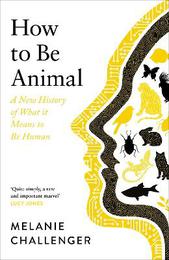
|
How to Be Animal: A New History of What it Means to Be Human
Paperback / softback
Main Details
| Title |
How to Be Animal: A New History of What it Means to Be Human
|
| Authors and Contributors |
By (author) Melanie Challenger
|
| Physical Properties |
| Format:Paperback / softback | | Pages:272 | | Dimensions(mm): Height 234,Width 153 |
|
| Category/Genre | Ethics and moral philosophy
Popular science
Pets and the Natural World |
|---|
| ISBN/Barcode |
9781786895738
|
| Classifications | Dewey:128 |
|---|
| Audience | |
|---|
| Edition |
Export/Airside - Export/Airside/Ireland
|
| Illustrations |
Black & white images (photos and drawings throughout); Illustrations, unspecified
|
|
Publishing Details |
| Publisher |
Canongate Books
|
| Imprint |
Canongate Books
|
| Publication Date |
4 February 2021 |
| Publication Country |
United Kingdom
|
Description
Humans are the most inquisitive, emotional, imaginative, aggressive and baffling animals on the planet. But how well do we really know ourselves? How to Be Animal writes a remarkable story of what it means to be human and argues that at the heart of our psychology is a profound struggle with being animal. As well as piecing together the mystery of how this psychology evolved, the book examines the wide-reaching ways in which it affects our lives, from our politics to the ways we distance ourselves from other species. We travel from the origins of Homo sapiens through the agrarian and industrial revolutions, the age of the internet, and on to futures of AI and human-machine interface. We examine how technology influences our sense of our own animal nature and our relationship with the other species with whom we share this fragile planet. Drawing on new evidence from a wide range of disciplines, Challenger proposes that being an animal is a process, beautiful and unpredictable, and that we have a chance to tell ourselves a new story, to realise that if we matter, so does everything else.
Author Biography
Melanie Challenger works as a researcher on the history of humanity and the natural world, and environmental philosophy. She is the author of On Extinction: How We Became Estranged from Nature. She received a Darwin Now Award for her research among the Canadian Inuit, and the Arts Council International Fellowship with the British Antarctic Survey for her work on the history of whaling. melaniechallenger.com
ReviewsThe best critique of the myth of human exceptionalism I have read. Clearly and beautifully written, compellingly argued and packed with powerful and moving stories, it shows how the fact that we humans are animals has been denied and repressed, with profoundly damaging consequences for the way we live and for the planet. But this brilliant book is not only a critique. By showing that being human means being animal, it reveals how much joy in life we can gain if we recognise and accept the truth about ourselves. Read and digest this book, and you will not only be wiser but also happier -- JOHN GRAY * * author of Feline Philosophy * * Melanie Challenger's wonderful book teaches me this: our blazing continuity with the depth of time and the whole of life. It is a huge, complex and triumphant thing: challenging, but also celebratory, courageous, mournful and apprehensive. Her language is lovely: exact and lyrical and sparklingly full of suggestion and implication. It is a hymn to generosity. I know it will be something I will return to again and again -- ADAM NICOLSON * * author of The Seabird's Cry * * This is a brilliant book that, like many brilliant books, explores what it means to be human. The difference here is that the author answers this by highlighting one central human dilemma: we are an animal in denial that we are actually an animal -- MATT HAIG * * Observer * * What an interesting book! The recognition that we are animals should come less as a slap in the face than as a welcome reminder of the great resources that can come from paying attention to the ways we and our various cousins handle our journeys on this difficult but beautiful planet -- BILL McKIBBEN * * author of Falter: Has the Human Game Begun to Play Itself Out? * * With this book, Melanie Challenger fearlessly plunges into the biggest question of our time: how can we rediscover our animal selves, before it is too late? How can we discover our true place in the wider world we are destroying? Each of us has to answer this question for ourselves. This book is a guide for you on the journey -- PAUL KINGSNORTH Erudite, lyrical, delightfully troubling and full of unexpected convergences. A wonderful exploration of the tensions that beset the human animal trying to find our way. I was entranced by this beautiful weave of history, biology and philosophy -- DAVID GEORGE HASKELL * * author of The Forest Unseen * * Deepened my understanding of the world . . . An illuminating, beautifully written and unique philosophical inquiry by a wide-ranging and original thinker and a powerful call for a new ethic for our relationship with the rest of the living world . . . Quite simply, a rare and important marvel -- LUCY JONES * * author of Losing Eden * * A provocative, incisive and worried book, carried off with no small degree of elan . . . an excellent primer to the problems we have caused and that we face * * Scotsman * * Provocative . . . Challenger [writes] with the logic of a researcher and the lyricism of a poet * * Herald * * Blending personal experience with scientific observation, Challenger has a talent for making the known seem unexpected or unsettling * * Irish Times * *
|